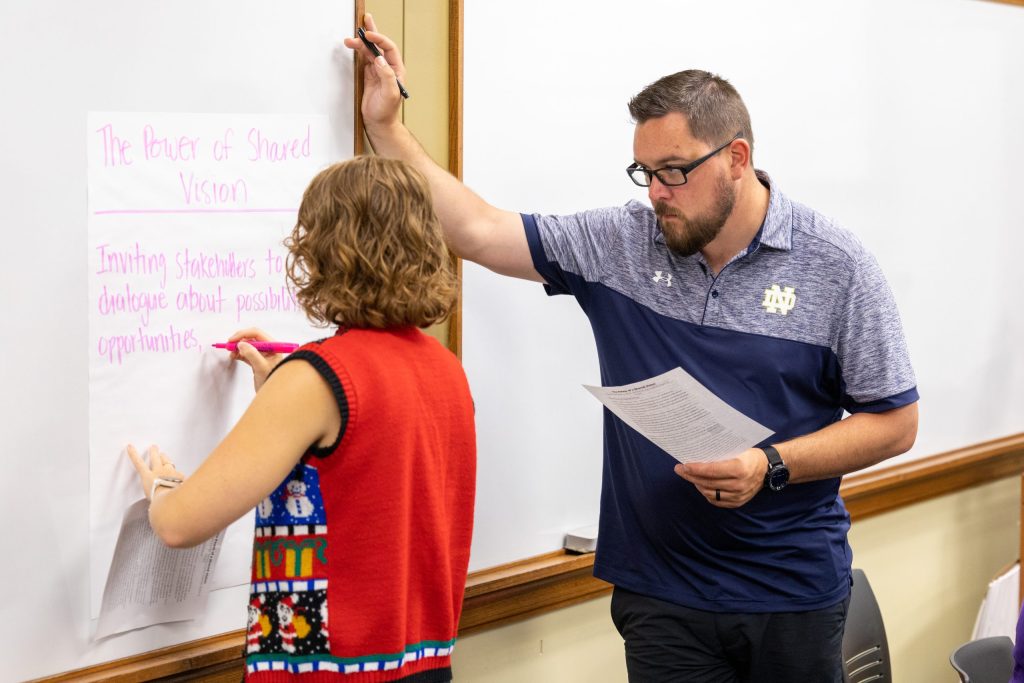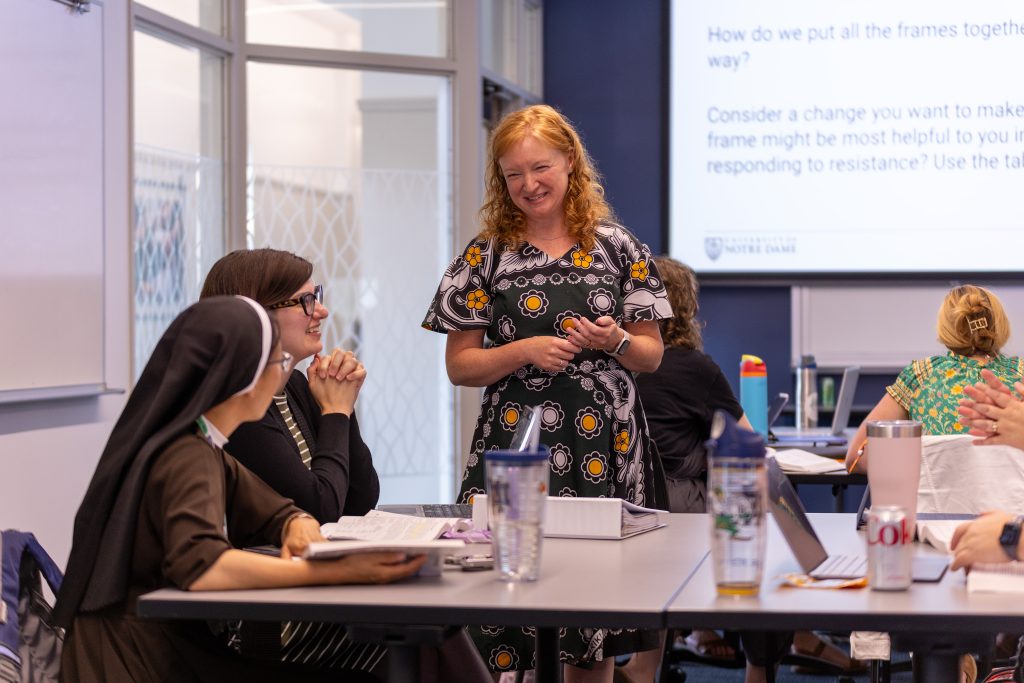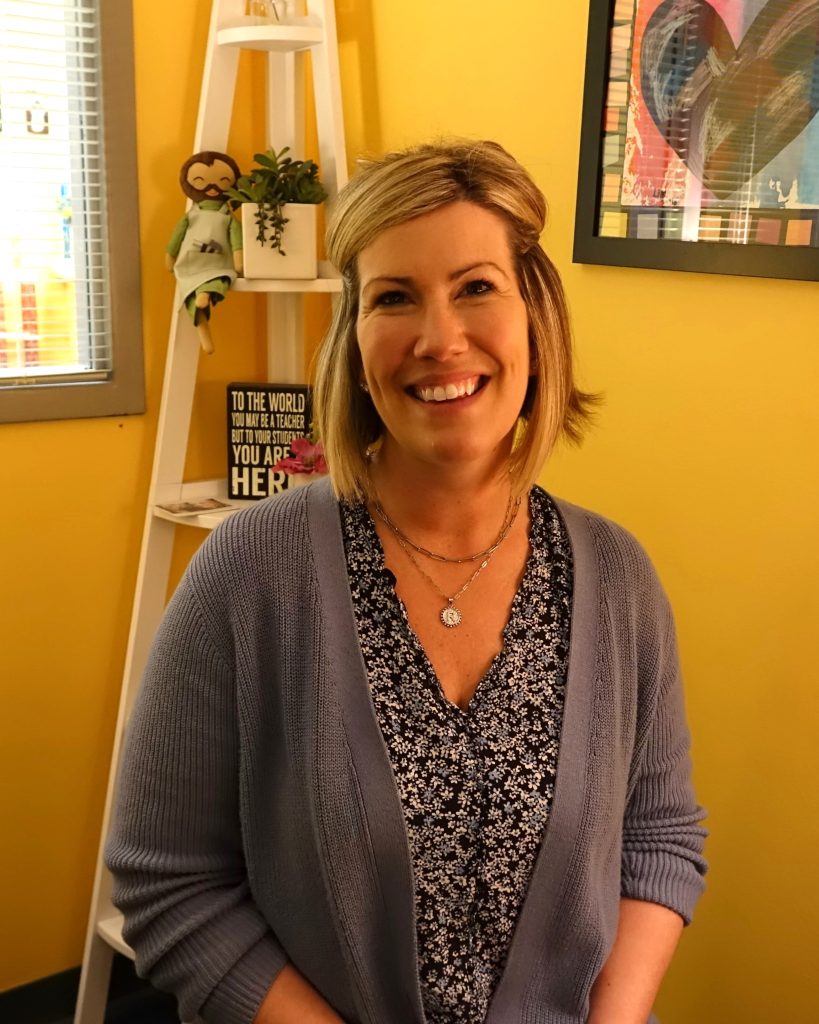April 23, 2024 // Diocese
Notre Dame’s Remick Program Trains Catholic School Leaders
Kevin Baxter, Director of the Mary Ann Remick Leadership Program at the University of Notre Dame, calls the initiative a “practical principal preparation program.” What makes the program unique, he said, is its exclusive focus on Catholic leadership. “What we are trying to do is form people to be great Catholic school principals,” Baxter said succinctly.
The Mary Ann Remick Leadership Program is a 25-month graduate program that combines online and in-person classes and grants students a master’s degree in educational leadership upon completion. Named after its endowment donor, the program has been running since 2002, with more than 500 graduates across the nation and even the world. About a dozen graduates work locally in schools in the Diocese of Fort Wayne-South Bend.
The Remick program is a work of Notre Dame’s Alliance for Catholic Education (ACE). Before the Remick program’s formation, ACE’s core work was training Catholic teachers. “There was a need that surfaced for a leadership program,” Rachel Frey, Assistant Director of the program, told Today’s Catholic.

Photos provided by the Mary Ann Remick Leadership Program
Faculty of the Mary Ann Remick Leadership Program teach participants in training to be Catholic school principals.
Many applicants to the Remick program come from previous graduates’ nominations, Frey said. “That tap on the shoulder of someone saying, ‘I think that you could be a great Catholic school leader,’ [is] so powerful for someone,” Frey said. She added that even if that person doesn’t apply right away, often that initial encouragement will linger until years later when the person discerns to apply.
The focus on spiritual growth is one that Baxter called “first and foremost” in the program. As Frey said, the program includes retreats and talks about spiritual formation, such as discussions about different types of prayer and how to lead spontaneous prayer as a Catholic principal.

Betsy Okello, right, is a faculty member for the Mary Ann Remick Leadership Program at the University of Notre Dame.
Baxter has had a lengthy career in leadership and education, including as a teacher, principal, and superintendent. He currently teaches some leadership courses in the Remick program and said much of what he teaches comes from his own personal, practical experience as a school leader.
He does not underestimate the work of a teacher. When Baxter was a first-year principal, his mentor at the time asked him, “Kevin, when are you going to be a superintendent?”
“I was kind of shocked. I was like, are you kidding me?” Baxter remembered. “And I said to him at the time, ‘I never really want to come out of the classroom. … I’m a principal now, and that’s fine, but I really love teaching.’ And he said, ‘Every good superintendent never wanted to come out of the classroom.’”
“Really great principals are also really great teachers,” Baxter said. “It’s why we get into this field in the first place.”
One of the main qualities Remick program officials look for in an applicant is commitment to Catholic schools. “People who are committed, they see this as their vocation,” Frey said. In fact, the program requires that every applicant be already currently employed at a Catholic school, whether as a teacher, assistant, or principal.
Frey added that another quality applicants should have is “openness to growth,” both in their work and in their faith life. “We want these individuals to be lifelong learners … because if they are a lifelong learner, they’re likely going to lead a faculty that can also be a group of learners together,” Frey said.

Kasia Balsbaugh
Rachel Schroeder, Assistant Principal at St. Joseph Grade School in South Bend, is in the current cohort of the Mary Ann Remick Leadership Program.
Rachel Schroeder is in her first year of the Remick program as a member of the 22nd cohort. She is Assistant Principal at St. Joseph Grade School in South Bend, which is no stranger to the Remick program, as its Principal, Melissa Green, is a graduate of the program’s very first cohort.
Schroeder spent 17 years as a first-grade teacher before transitioning to assistant principal in 2021. While she said she was excited for the opportunity to serve the whole school, she felt she could do more with formal training. “I knew that it could help me to better serve our community,” Schroeder said. “Having the coursework, the true formation that the Remick program could provide, was something that I very much wanted.”
Schroeder said she is impressed with the Remick program’s focus on community among the cohorts and faculty.
“The Remick program does such a beautiful job gifting us opportunities to work with one another,” Schroeder said. Participants have small groups and partner work, and during in-person summer classes, they are encouraged to dine together and get to know one another. While the summer coursework was “intense,” Schroeder said, the evenings left free time for the participants to relax. Schroeder said a favorite evening activity with her cohort was karaoke nights. “Karaoke is a fun way to let loose and let our hair down, for sure,” she said with a laugh.
Schroeder said she has continued to be impressed with the availability of the program directors and faculty, including the ways they facilitate community and connection from a distance. The school year coursework is asynchronous and online, built for busy schedules. The workload is “definitely manageable,” Schroeder said, adding an average of perhaps a few hours a week. She completes a variety of assignments from papers to role plays with partners, research, and personal reflection.
Schroeder also felt she has grown as a leader while in the program.
“While I feel like a lot of what I’ve experienced has been working alongside teachers, I recently completed an assignment that forced me out of that comfort zone and more as a lead-learner where I led a small group of teachers through some data analysis,” she said.
Frey agreed that the coursework during the school year is meant to be implemented in participants’ real school settings.
Baxter said strong Catholic schools and leaders are crucial for dealing with the crisis of Catholicism in the United States, where fewer and fewer Catholics are attending Mass.
“The number one challenge for Catholic schools today, and this is nationwide, is the challenge with enrollment and continued disaffiliation … with people not practicing their faith as much,” Baxter said. “Nationwide you see Catholic marriages dropping, you see the number of baptisms dropping. … One of the best solutions we have is Catholic schools,” Baxter said, adding that strong and faithful Catholic education can inform Catholics about their faith.
Those who spoke to Today’s Catholic said dioceses are in dire need of people for this work. Frey said the Remick program receives emails every day from schools around the nation looking desperately for people to lead their schools in some capacity.
“I don’t have enough people to fill that need,” Frey said, adding, “there is such a need out there for quality, committed Catholic school leaders.”
Of course, the job isn’t for everyone. Baxter said that if there was something he wanted every Remick graduate to know it is that “leadership is complex” and often romanticized. But Baxter encourages school leaders to find the joy in their work – those “Resurrection moments,” he called them – such as the joy of walking through a kindergarten classroom or playing with students at recess.
“There are going to be plenty of struggles and plenty of things you’ve got to deal with that aren’t great, but find those joyful moments and really connect to those,” Baxter advised.
As Schroeder put it from her experience in the program, “We talk a lot about the zeal, and that energy, that love, and that passion – again, for not only the work that we do but the people that we do the work for. And that really stands out to me.”
To learn more, visit ace.nd.edu/programs/leadership.
The best news. Delivered to your inbox.
Subscribe to our mailing list today.







